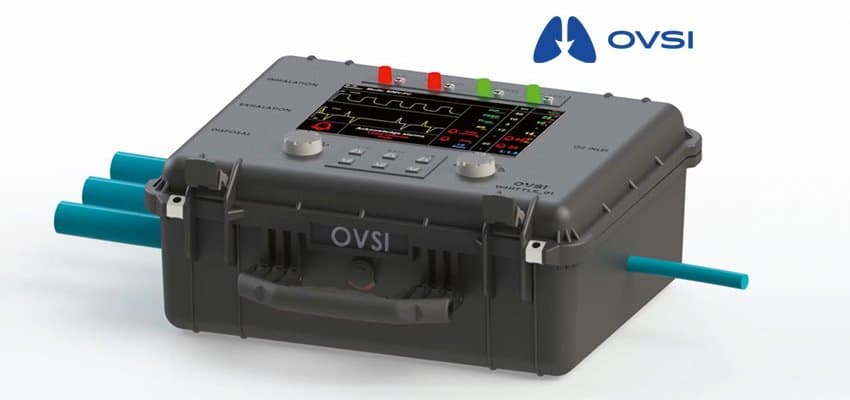A new ventilator and oxygen concentrator created in Cambridge will help potentially help serve hundreds of millions of people treat patients third world countries.
Why the Open Ventilator System Initiative (OVSI) ventilator is important
According to the World Health Organisation, when the COVID-19 pandemic hit there were fewer than 2,000 working ventilators to serve hundreds of millions of people in public hospitals across 41 African countries. Ten countries in Africa had none at all. Even where ventilators were available oxygen supplies were questionable at best.
The capability to use external oxygen supply to increase the oxygen concentration
The OVSI ventilator is a pressure based system, it has the capability to use external oxygen supply to mix with the ambient air to increase the oxygen concentration to the patient. The OVSI ventilator can be built in-country by engineering companies around the world, and is designed to be simple, affordable and high quality.
Oxygen concentrator project
Following months of planning, design, component and desiccant sourcing and the manufacture of custom parts and the sourcing of compressor units with the support of Cambs Compressor Engineering Ltd, the first phase of testing modelled scenarios for the oxygen concentrator began in early November. The concentrator team in Cambridge is led by Dr David Fairen-Jimenez with Dr Ewa Marek from CEB, together with Mythili Sutharson and Ben Moore, both students at the University of Cambridge, and supported by Cambridge Precision Ltd, Immaterial and the Centre for Global Equality. The Cambridge team is working closely with engineering teams in Ethiopia and Kenya to ensure that OVSI designs are compatible with the environmental, infrastructural and socio-economic conditions of target countries.
“Staff from Cambs Compressor Engineering Ltd have worked with the team at the University and Cambridge Precision Ltd, to redesign the pump and developed a dual cylinder technology which is making all the difference to efficient operation.”
Professor Axel Zeitler CEB, University of Cambridge
The same single-cylinder rig design is being run concurrently in Cambridge and the Bahir Dar Institute of Technology in Ethiopia in order to provide critical comparative data from alternative settings. The engineering team at the University of Nairobi began testing in January, using a dual cylinder design, which is now proving to be viable and will form the basis of further development work. All of the testing is being carried out using zeolite 13X supplied by the Arkema Group.
The goal is to have a fully regulated version of the device ready for launch during 2021. Additional funding is actively being sought to enable the programme to broaden its scope from a COVID-19 response to treatment of a range of respiratory conditions, particularly those that are endemic in developing countries, such as childhood pneumonia.
The OVSI design brief
The OVSI was established in March 2020 to develop an open source, low cost, high-quality ventilator system for under-resourced contexts, such as public hospitals in low- and middle-income countries.
The aim was to create a ventilator with the following capabilities:
Much lower cost and time of manufacture – Parts need to be easily and cheaply sourced from around the world. Removal of unneeded parts and replacement of high cost parts.
An open source design – Can be built in-country by large engineering companies around the world. Allows manufacture to stay in country after crisis.
Robust to varying needs – To cover the wide spectrum of patient ventilation requirements, the system will be able to work in three modes (Non Invasive, CPAP and BiPAP, Mandatory or Patient Triggered Ventilation). If the system is initially built for Non Invasive, it can be upgraded quickly later.
Applicable to local oxygen infrastructure – Local oxygen availability varies (between countries and between hospitals, in the infrastructure). The system needs to have low oxygen use and the potential to add an oxygen concentrator.
A vital aspect of the OVSI initiative is that the designs be open sourced so that they are available globally.
Cambs Compressors worked with University of Cambridge Open Ventilator System Initiative team, led by Dr Tashiv Ramsander, and helped develope a high-performance ventilator for manufacture in low and middle-income countries that became the first intensive care quality ventilator to be manufactured in Africa.
The Centre for Global Equality (CGE) is one of the co-founders of OVSI, along with the Department of Chemical Engineering and Biotechnology, the Department of Physics and the Whittle Laboratory in Engineering at the University of Cambridge, Cambridge Aerothermal, Interneuron and Cambridge Global Health Partnerships. Other core OVSI collaborators include Beko, Prodrive and Cambridge Precision in the UK, Defy and Denel in South Africa, the University of Nairobi (Kenya) and Bahir Dar University (Ethiopia).



